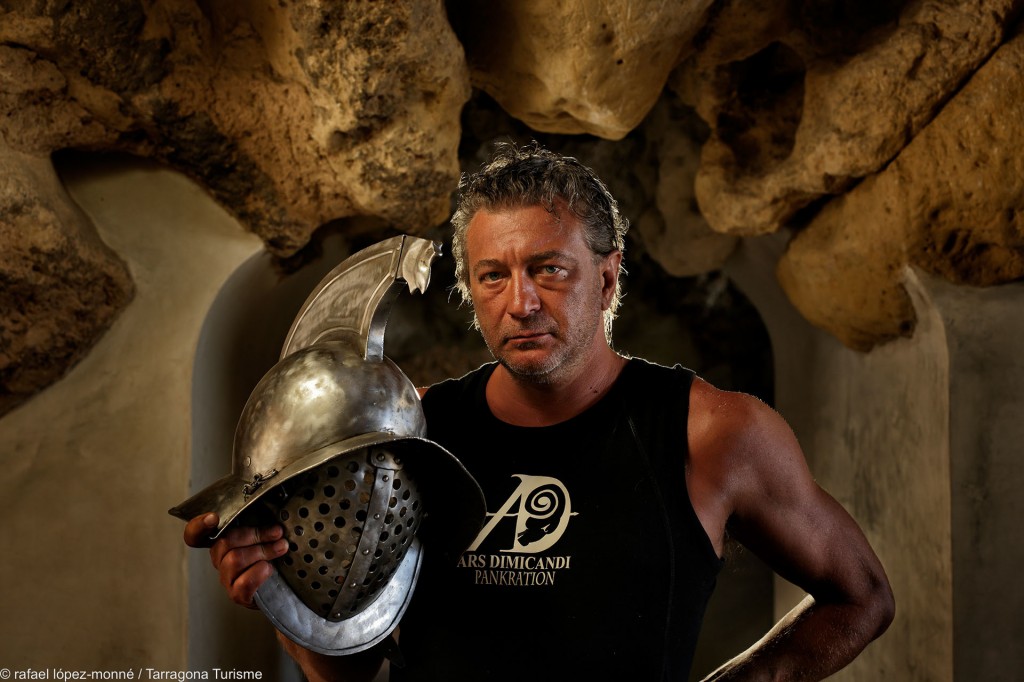Victories inside the arena turned the courageous Tetraites into such a celebrity that his achievements were spread across the entire Roman Empire, from Pompey to Gaul, and even up to Britannia. His modern colleague Darius from Bergomum (Bergamo) might not be that famous, but he’s been studying, training and fighting the way gladiators did for the last 20 years. Thousands of people have attended the “experimental archaeology” demonstrations by Ars Dimicandi, a mix of competition, rituality and emotion that brings the munera (offering to gladiators) closer to the audience, and so they get to understand why that became the favourite entertainment for the Romans.
With or without a sword, Darius (Dario Battaglia) is a true fighter for historical disclosure. The way he identifies himself with the gladiator’s lifestyle goes way beyond the mere experimentation. Since the beginning of the 90s, when he got deeper in the study of the singularity of professional fighters –mostly slaves willing to buy their freedom, but also Roman citizens in search for glory and money–, Dario has become a pioneer in practical disclosure. He founded a school in Italy and over 80 gladiators train twice a week in order to improve their abilities.
“No fearsome person could ever become a gladiator. One needs a lot of both physical and technical, but also mental training, depending on each person’s speciality. You can’t just throw in the towel, as in other modern fighting disciplines. We should be at the service of the people, and when we hit each other, being friends as we are, we leave more scars in our brain that in our skin”, says Darius. The public of Tarragona’s Amphitheatre –a place absolutely worshiped by Darius, almost as his second home– know it very well, as it’s now fifteen years since Ars Dimicandi started performing there due to the Tarraco Viva festival.
The gladiator’s discipline represents the victory of willpower. Unlike what is considered common in many aspects in life, the only thing keeping these arena fighters away from the public trial is their bravery and courage. “This is not like military exercise, where everything is allowed in order to defeat the enemy. It is not just about winning, but about seducing the audience in the first place: suffering, becoming heroes whether we lose or win, and making people engage with us, since they are the final judges”, says Battaglia.
It is not that the 21st century spectators will decide whether the loser should live or die depending on his honour, but it is true that these fights, which involve no sharp weapons, do really excite the crowd. And, in fact, the number of admirers gathering in Tarragona to admire the Ars Dimicandi getting their weapons ready is always very large. “Gladiator combats were one of the shows preferred by the Romans, and because of their heroism, many became very famous and desired. The Messi and Cristiano Ronaldo of the Roman period would clash swords to death”, explains Battaglia.
Rigour and entertainment are not always the same thing, but Ars Dimicandi always stress that they should not be incompatible. Hollywood’s glamour helped to develop a popular very clear image of Rome, despite being not very precise. As a disseminator, Dario Battaglia contributes to correct this kind of stereotypes by advising big shows. This is the case with the famous TV series Rome (HBO, 2005-2007), or the remake of Ben-Hur, a blockbuster worth €120M produced by Paramount and Metro Goldwin Meyer that should be ready by 2016.
Born in the Lombardy area, Dario sees himself as a bit of a Catalan in his way of thinking and acting, and doesn’t miss the chance to spend some holidays, enjoying Tarraco’s gastronomy and beach, together with his wife and son. He speaks only words of wonder about Tarragona, the city he visits every year and the place where he met some very good friends; and especially about the Tarraco Viva Festival, a project he admires and that, to his opinion, is “the most important festival of historical disclosure in the world”. “It created its own original and demanding model, which has been crucial for us to grow as a team: it has pushed us to investigate, always improving, in order to provide spectators with new contents. In Italy, on the other hand, there’s a very profound preconception against the Roman Period. The level of knowledge and potential to disseminate it is huge, but is related to Mussolini’s fascism, as he used it for his own good, and so it is not very popular”, he says.
Text: Oriol Margalef (@OhMargalef on Twitter)
Photographer: Rafael López-Monné (@lopezmonne on Twitter)
Translation: Artur Santos (@artur_1983 on Twitter)




